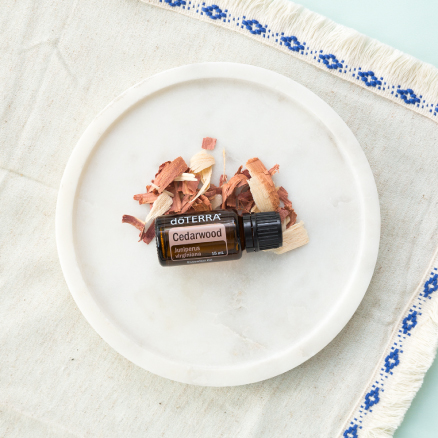Origin: a Latin derivative
meaning "Gift of the Earth."
Cedarwood Oil Uses and Benefits
Essential Oil Spotlight
Essential Oil Spotlight

The warm, woody scent of Cedarwood oil, or Cedar oil, offers numerous benefits to the user. Not only does Cedarwood oil produce a grounding aroma that promotes feelings of vitality and wellness, it also has many applications for everyday life. Whether you are using Cedarwood oil topically or aromatically, for its clarifying properties or to keep insects at bay, or to promote vitality during a workout, the uses and benefits of this oil are almost limitless.
Cedarwood Essential Oil Uses and Benefits
- Because it is a grounding oil that can promote emotional balance, Cedarwood oil is a good essential oil to diffuse at the end of a long day when you want to create a relaxing environment. Cedarwood oil holds calming and grounding properties for both the mind and body, making it a popular oil for topical as well as aromatic use. When diffusing Cedarwood oil, use three to four drops in the essential oil diffuser of your choice and enjoy the grounding, calming effects that this oil has to offer.
- Did you know that many people use Cedarwood oil for skin due to its clarifying abilities? You can easily incorporate Cedarwood oil into your daily facial routine by simply adding one to two drops of Cedarwood oil to your facial toner or moisturizer for added clarifying properties.
- Cedarwood oil’s chemical makeup makes it effective at repelling insects. To keep bugs away, you can create your own essential oil bug repellant formula using doTERRA Fractionated Coconut Oil and Cedarwood oil (simply apply to the body before going outside).
- Cedarwood oil is known to promote relaxation, and can be used in several instances to calm the mind. For example, you can apply Cedarwood oil to the bottom of your child's feet to help promote a peaceful and settled feeling before bedtime. When you find yourself distressed by unfamiliar situations, inhale the aroma of Cedarwood oil to promote calming emotions. When it comes to promoting calming, grounding feelings, Cedarwood oil is a helpful companion.
- Diffusing Cedarwood oil in your home, office, or workspace can help promote feelings of confidence and self-esteem. The warm, herbaceous aroma of Cedarwood oil is grounding and can help evoke feelings of wellness. When striving to promote confident feelings or feelings of self-esteem, diffuse two drops of Cedarwood oil with two drops of Wintergreen in the essential oil diffuser of your choice.
Where to Buy Cedarwood Essential Oil
Are you ready to enjoy the benefits of Cedarwood oil for yourself? Visit our Cedarwood oil page to learn more about ordering your own. As you build your essential oil collection, you’ll want to ensure that you are using high quality, pure essential oils. With the doTERRA CPTG® testing process, doTERRA oils remain at a high-quality level. Once you purchase your own doTERRA Cedarwood oil, take a look at the uses and benefits section below to get the most out of your product.
Plant Description
There are many types of cedar trees, but all are coniferous, evergreen trees from the cypress family. The red cedar tree is able to withstand extreme climates, and can tolerate most soil types. This ability may come from the cold, high altitude climates cedar trees are natively from. Depending on soil conditions, the tree can reach anywhere from 16 to nearly 100 feet high. It is also a species with an unusually long lifespan, with some trees reaching 900 years old. doTERRA Cedarwood oil comes from the wood of the species Juniperus virginiana, more commonly known as the red cedar. The red cedar is a species of juniper that provides a very fragrant aroma—making it perfect for essential oil production.
History of Cedarwood Essential oil
The use of cedar oil from different trees, and cedar wood in general has a long historical past. The cedar of Lebanon is thought to be one of the first essential oils extracted from nature. The Sumerians regarded the cedar tree to be the Tree of Life. Ancient tribes believed God held the energy of the Cosmos in the cedar and that the wood was sacred, gifting those worthy with power, greatness, and immortality. The Egyptians incorporated it into their embalming rituals. The Phoenicians and Assyrians even used cedar to build fleets of ships.
Chemistry of Cedarwood Essential Oil
Main Chemical Components: α-cedrene, cedrol, thujosene
What is the chemistry of Cedarwood oil like? Cedarwood falls under a group of chemicals known as sesquiterpenes. Essential oils that contain sesquiterpenes are commonly known for their ability to promote grounding and balance of emotions when used aromatically. Cedarwood oil includes the main sesquiterpene constituents cedrene, and thujopsene, which help improve the appearance of skin and promote grounding of emotions and emotional balance. Similar to Vetiver, and Patchouli, and Sandalwood, Cedar oil is commonly known as a grounding oil because of its chemical makeup.
Oils that blend well with Cedarwood oil
As a warm, woody essential oil, Cedarwood oil produces an aroma that is reminiscent of the outdoors. Because of its warm properties, Cedarwood oil blends well with herbal oils like Clary Sage, woody oils like Cypress, and even other spicy essential oils like Frankincense. Cedarwood oil also blends well with Bergamot, Cinnamon Bark, Lemon, Patchouli, Sandalwood, Thyme, and Vetiver.
Cautions
Possible skin sensitivity. Keep out of reach of children. If you are pregnant, nursing, or under a doctor’s care, consult your physician. Avoid contact with eyes, inner ears, and sensitive areas.








